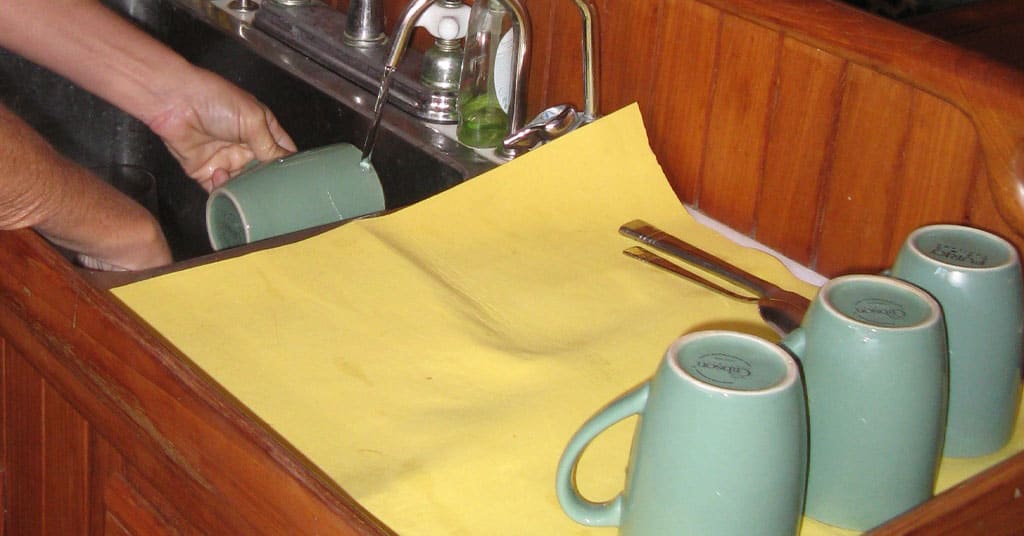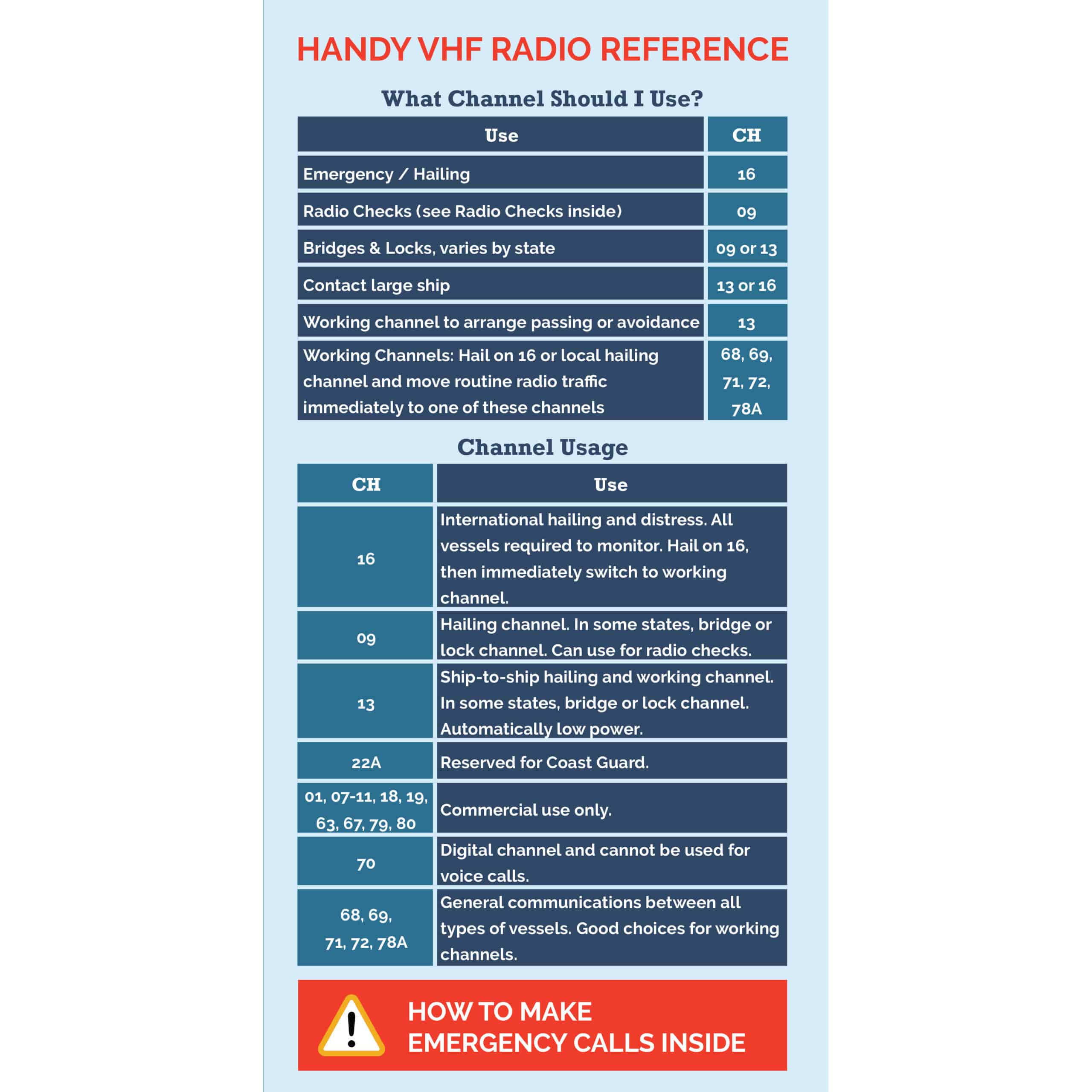Hand washing dishes on a boat has some major differences from washing dishes on land. And if you’ve never done it before, perhaps you could use a few tips?
No, this isn’t a step by step “how to wash dishes” article. But I did learn a few things while we cruised that didn’t necessarily make the job any more fun, but did help me to not make it any worse and/or save water. Here are some things I wish I’d learned sooner:
Try the Local Dish Soap
If you’re outside the US, local dish soaps can work even better than more expensive imported US brands. In Mexico, where we cruised, few homes have dishwashers and hence there is a huge market for good dish soap. Watch what the local women are buying and try a bottle.
Doing Without a Disposal
Most boats don’t have a garbage disposer. Assuming yours doesn’t, it’s really important to scrape dishes and pots well before washing them to avoid clogged drains. If one does clog up, see the tips in Slow or Stopped Galley Drain. Scrape not just food bits, but grease as well. I’d put the “gunk” into old Ziploc bags or jars from the trash whenever I could, as bugs were less likely to feast on the garbage. Read more here.
Dried-On Dirt
Four ways to get that burnt-on food off without using a ton of water:
- Fill with water and drop in a few denture tablets.
- Spray with vinegar and let sit 15 minutes or so.
- Sprinkle some baking soda in the pan and then fill with boiling water above the stuck-on food. Let sit 15 minutes.
- Scrub with salt. This still takes some elbow grease!
Avoid Steel Wool Pads
If you’re in a salt water environment — even if you’re using fresh water for dishes — steel wool, Brillo pads and the like have no place on the boat. Not only will they quickly rust and disintegrate, they’ll leave tiny particles on your pans that will cause little rust spots to form (yep, you can guess how I learned this). Use the plastic or stainless scrubby pads instead.
Or switch to brass or bronze wool pads. You can find them in the woodworking section of any hardware store or on Amazon.
Use Leftover Water from Cooking
Instead of just discarding the water that pasta or veggies were cooked in, save it and pour it into your dirtiest pans with a little soap after serving up. The pans will soak while you’re eating and clean up will be a snap.
Wash Least Dirty Dishes First
If you start with the least soiled items — generally glasses — first and proceed to dirtier and dirtier, you’ll use less water as you probably won’t have to change the water. But if you wash greasy items before washing the glassware, you’ll probably have to change the water.
Use Cold Water
Cold water will clean dishes. You don’t have to use hot water to get dishes clean, but it does make it easier to get grease off. Cold water and scrubbing can do just as good a job.
Don’t Fill the Sink
You don’t need a sink full of water. I know, I used to like to soak dishes in the sink. But I learned to just put soapy water in a cup or cereal bowl, then use it to wipe plates and other dishes and let them sit in the sink for a few minutes. Just as good results with a LOT less water!
Save Water When Rinsing
Some cruisers suggest using a spray bottle to rinse dishes in order to conserve water. It does use the least water, but a spray bottle takes forever and wears your hand out. I use a small pressure sprayer called an Aquabot — learn about it here — it works great and saves a lot of water.
Air Dry Your Dishes
Okay, I’m basically lazy and have always let my dishes air dry unless I was pressed for space or needed something immediately. But I recently learned that air drying is MUCH more sanitary than drying dishes with a cloth, which can both spread germs from one dish to another, and also breed germs of its own when left damp. Of course, you can’t leave dishes out drying if underway and it’s at all rough.
Tips From Other Cruisers
Over the years, I’ve gotten some great tips from other cruisers. Diane suggests that if you need to remove stuck or burnt food from pans (that are NOT non-stick), use cream of tartar instead of scouring powder. If the dirt is very stubborn, make a paste and let sit on the stuck food for a minute. I haven’t tried this myself. But let me know in the comments if it has worked for you.
Tami reminds us that deglazing a pan is a great way to remove burn on bits while also making a flavorful sauce. Just add wine, broth, or even water to a hot pan while you’re cooking.
And finally, Amanda said that moving to silicone bakeware has eliminated her need to scrub since nothing sticks to it.
I hope these tips are useful to you. Washing dishes on a boat will probably never be your favorite task. But a good method can help you save water and keep the work to a bare minimum. And for more methods that flatten the learning curve for boat life, check out our Basics of Living on a Boat Course or the All-Access Pass that gives you access to all our courses for one low price.
What are your favorite dish washing tips? Share in the comments.
Related Posts
Flatten the learning curve with practical how-to info that gives you the confidence to step into life aboard.
Start Learning Today

Carolyn Shearlock has lived aboard full-time for 17 years, splitting her time between a Tayana 37 monohull and a Gemini 105 catamaran. She’s cruised over 14,000 miles, from Pacific Mexico and Central America to Florida and the Bahamas, gaining firsthand experience with the joys and challenges of life on the water.
Through The Boat Galley, Carolyn has helped thousands of people explore, prepare for, and enjoy life afloat. She shares her expertise as an instructor at Cruisers University, in leading boating publications, and through her bestselling book, The Boat Galley Cookbook. She is passionate about helping others embark on their liveaboard journey—making life on the water simpler, safer, and more enjoyable.










Carolyn Shearlock says
Thanks for the idea — I’ve never seen (or heard of) it, but now I’ll be looking!
Carolyn
Carolyn Shearlock says
Thanks! I’ll look for it. -Carolyn
Cindy Balfour says
I put any liquid soap in my dawn foam dispenser. Vinegar in rinse water helps to break up the soap. I have read that lightly wiping the inside of plastic storage containers with some mustard before rinsing keeps plastic from growing odors.
tami says
I’ve had good luck with a stainless scrubber. Found mine at Asian market. These are coarser than the wool.
The Boat Galley says
So many times someone asks me how I know something . . . yeah, learned the hard way.
Barbara Lowell says
neither is bleach marine friendly; it burns the eyes and hurts the respiratory system; I like to soak my burn dishes in vinegar and then boil for a few minutes; I use an old credit card to scoop out the crusty stuff; sometimes if its really bad i have to re-boil and try again; works great on cast iron too and directly on metal. You can cut and curve the credit card to match the contour of what you are cleaning.
Barbara Lowell says
love this … esp re-using the napkins which I already do already do; I keep a small cup of soapy water and a scrubber in the sink but the spray bottle is much better neater idea … thanx will adopt it.
Carolyn Shearlock says
Our dog is Mexican . . . I’ve never made anything too spicy for her! Too bland, sure. But too spicy, never.
Judith C says
You can also get copper scouring pads. And there are even some made from a wood like material, they are totally biodegradable.
The Boat Galley says
Not everyone is going to like every article. You have a lot of experience and this one didn’t appeal to you. Others who have never washed dishes with limited water may appreciate some tips to make it easier.
The Boat Galley says
Thanks so much.
The Boat Galley says
Well, we’d all like that. But there’s no room on my boat — plus, I kinda like our privacy! <3
Terry Bogart says
One can dream….
Charles Hagen says
It is easy to store too. Most come in a square bottle…unlike bleach.
Zak says
greetings boat people, I am a van person . like you living in a mobile confined space . a string/net bag or basket for air drying works well . I use a 2 ltr pump up spray bottle filled with water ,industrial strength ( mechanics use them ). expensive but it keeps the pressure for days and works upside down .rinses well and cools you down in the heat ( use a fan, wonderful …)